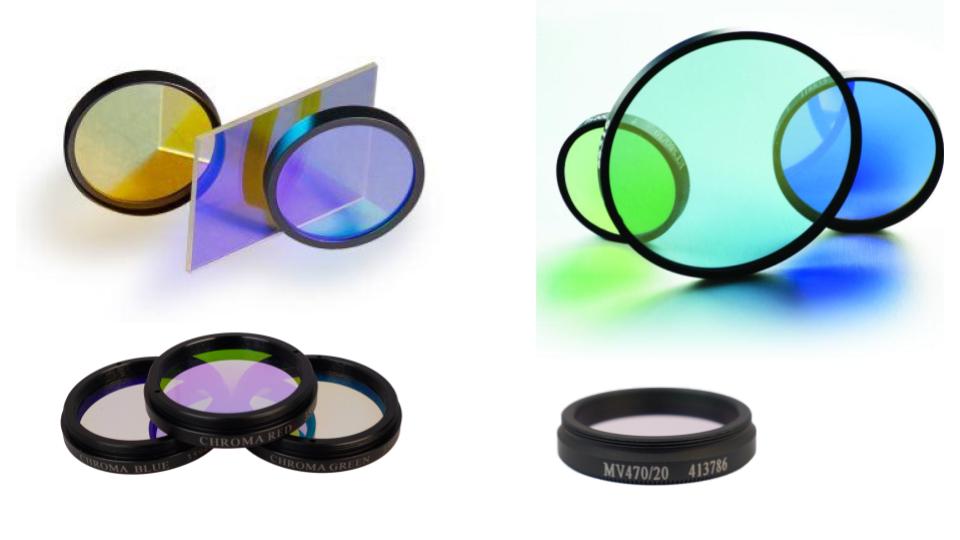Situated in Vermont, Chroma Technology manufactures precision optical filters and related products for science and technology. The company’s ethos is to develop the best optical products and solutions for its customers’ ever evolving needs.
This ethos is something that has never changed, since Chroma Technology was first established as a visionary idea in 1991. The founders were a team of six, who had previously worked together at another optical filters company. The six - Wim Auer, Paul Millman, Dick Stewart, Francis Kebbel, Wendy Cross, and Jay Reichman - started out with a vision of making a positive impact in science and industry, and they were driven by a real passion and commitment to industries in which they served.

The Chroma founders, left to right: Wim Auer, Paul Millman, Dick Stewart, Francis Kebbel, Wendy Cross, and Jay Reichman (Credit: Chroma Technology)
Jay Reichman, Senior Design Engineer, one of the original co-founders, and current chair of the company says: “It's been 33 years since we started, so the company has been my ‘baby’ for a long time. At the time, one of the other founders, Paul Millman, was a salesperson at the previous company, a very good salesperson. He identified an important new market niche, which was high-performance fluorescence filters and coatings for the life sciences. He saw the potential for that, which several employees in the company together had the skill sets to bring to market.”
Continuous growth, driven by innovation
It was from here Chroma began its journey to prominence, fuelled by a pursuit of excellence, continuous innovation, quality craftsmanship, and unwavering customer service. The team had all the skills to make the project a success, but what stood them out was their commitment to people. Says Reichman: “Paul really enjoyed interacting with people. He really liked the engineers and the scientists who are involved with the research and the product development. He ended up developing some solid relationships with them, and several of those became Chroma’s first customers.”
In 1994, Chroma achieved a breakthrough by manufacturing a comprehensive line of filter sets for a major microscope manufacturer. Explains Reichman: “One of our early successes was the development of multicolour filters and mirrors for a technique called fluorescence in situ hybridisation, otherwise known as FISH. It's a type of imaging analysis where they can image specific genes within chromosomes, which was pretty important for a lot of the early genomics genetic research.”
Subsequent years witnessed expansion and innovation, with notable developments such as the establishment of Chroma GmbH in 2005 and the inception of 89 North, Inc., an engineering subsidiary, in 2009. The firm’s commitment to innovation has garnered international acclaim, with accolades such as the SPIE Prism Award for Photonics Innovation in 2012, awarded to its subsidiary 89 North for the ground-breaking Heliophor technology. In 2013, Chroma attained B Corp certification, solidifying its dedication to social and environmental responsibility, and subsequent years saw further strides, including ISO certification in 2019 and heightened production efforts in 2020/2021 to address the challenges posed by the global pandemic.
A global presence and expanded optical capabilities
Today’s Chroma Technology has markets across the world, including in Europe, China and Japan. It also has around 190 employees worldwide. It has also expanded, bringing its expertise in the life sciences to new and exciting markets. Reflecting on Chroma's evolution, Reichman highlights this adaptability to new technologies and markets, he says: "We've stayed at the forefront of microscopy techniques, working with Nobel laureates. But we've also ventured into machine vision, expanding our capabilities into the shortwave infrared region."

Chroma Technology has expanded, bringing its expertise in the life sciences to new and exciting markets (Credit: Chroma Technology)
Jeff Clark, Engineering Manager at Chroma Technology joined the company in 1998, and today is responsible for Business Development. He has seen first-hand how the company has successfully transferred its skills to help customers in life sciences and beyond. He says: "We now cater to diverse sectors, from precision agriculture to industrial inspection, leveraging our expertise in optical filtering. For example, recently, suppliers of (SWIR) shortwave infrared, (InGaAs) Indium Gallium Arsenide Detectors and Quantum Dot Sensors have been able to scale up manufacturing. This has brought down the price of these detectors and made them more readily available for people in the industry allowing them to find new applications. With access to these new detectors and Chroma Technology’s ability to design and manufacture optical filters for the SWIR spectral region, integrators are able to offer solutions for applications such as food sorting, semiconductor inspection and precision agriculture. Farmers can target the specific areas of their fields, so they're only watering or fertilising the areas where it's needed, saving time and resources.”

Chroma Technology's manufacturing capabilities for high-performance optical filters involve precision techniques like thin-film coating and optical design (Credit: Chroma Technology)
A 100% employee-owned, people-centric business
One thing that hasn’t changed for Chroma Technology in the last 33 years is its people-centric approach, both when it comes to its customers, and its own team. Says Clark: “We have an optical filter catalogue that spans the spectral range of 200nm to 5000nm. But we're really a capability company that shows our catalogue products of what we can do. Ultimately, we understand that the customer’s need may not be what's found in our catalogue. We have over 20,000 different designs on hand, and also a large inventory but ultimately we try to figure out how to solve their problem and find a creative solution for their specific application. At the end of the day, we like to just work with the customer to figure out what is the price point, and ultimately is the solution for their application. And we can design a filter specifically for that.”
Adds Reichman: “We started out almost entirely employee owned, and we've continued that trend. We are now 100% employee owned and governed and we have a profit sharing programme that includes both cash and stock. Over time employees become invested in the company and increase their ownership stake. I think that's been important for the culture, and it's a great company to work for, just because of the people here who really want it to succeed. As well as customer retention, we also have long employee retention, as people tend to want to stay and grow with the company.”
Looking to the future
Looking ahead, Chroma aims to continue its legacy of innovation and service. Reichman asserts, "We're not just a product company; we're a solutions provider. Our website showcases our diverse capabilities, reflecting our commitment to meeting customer needs." Clark concludes, "As we navigate new frontiers, our dedication to quality, innovation, and community remains unwavering. We're excited for what the future holds.”


